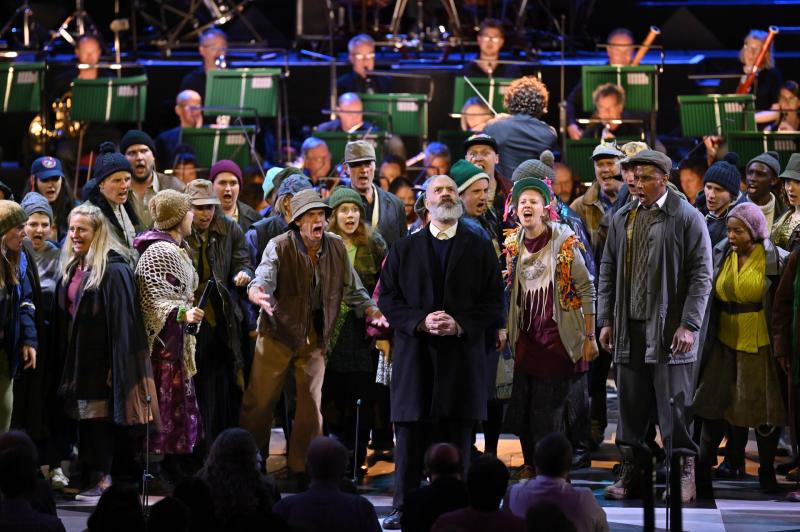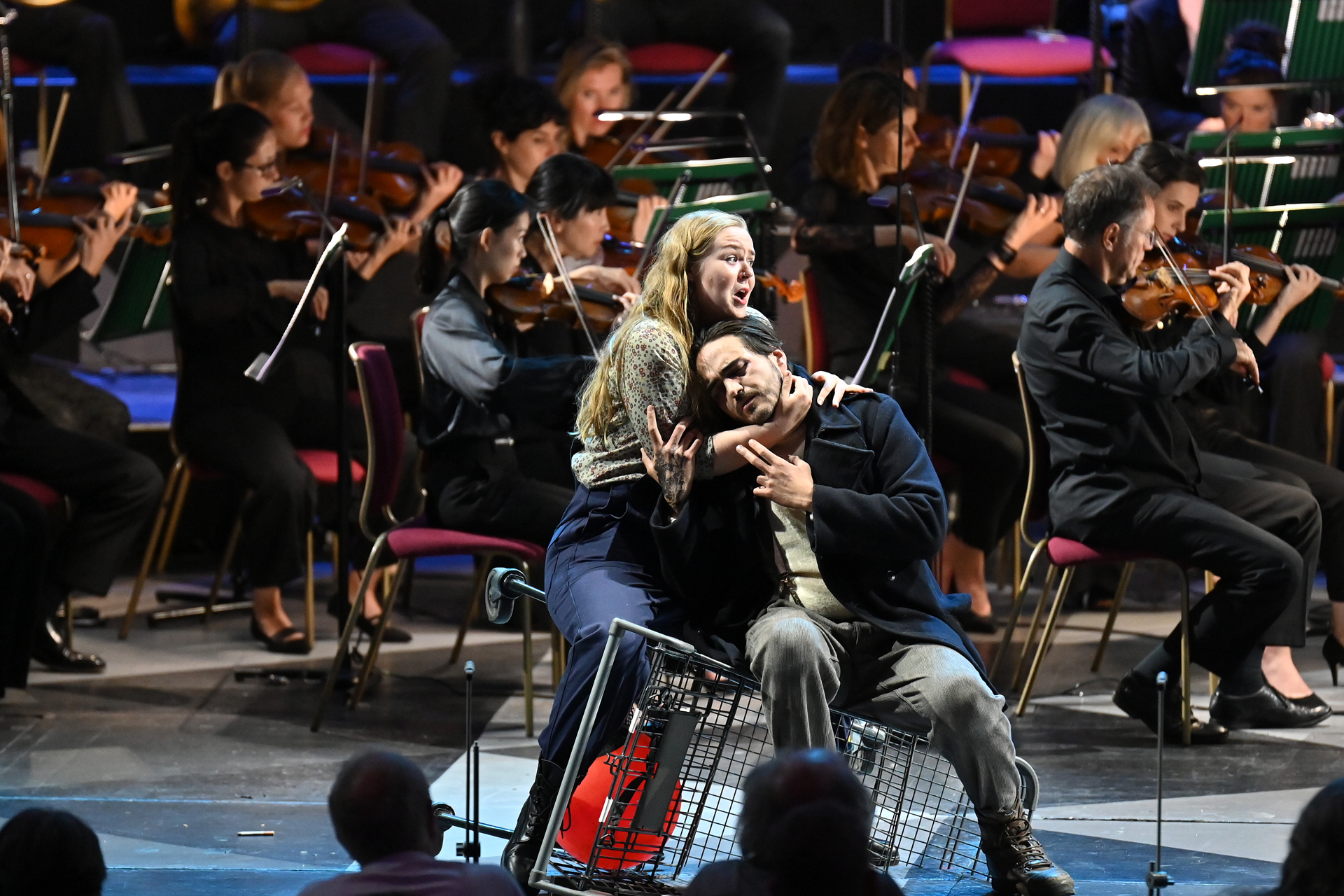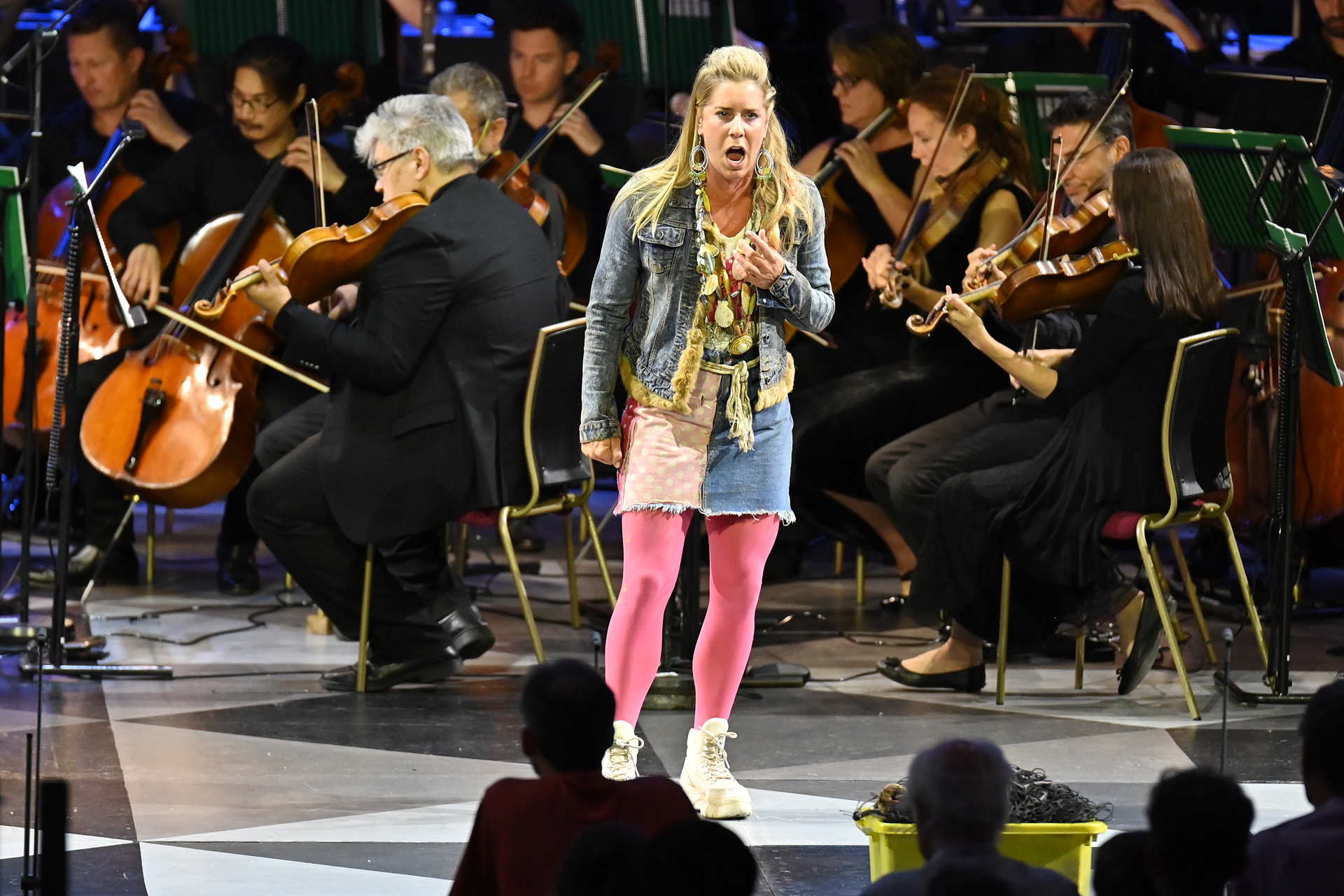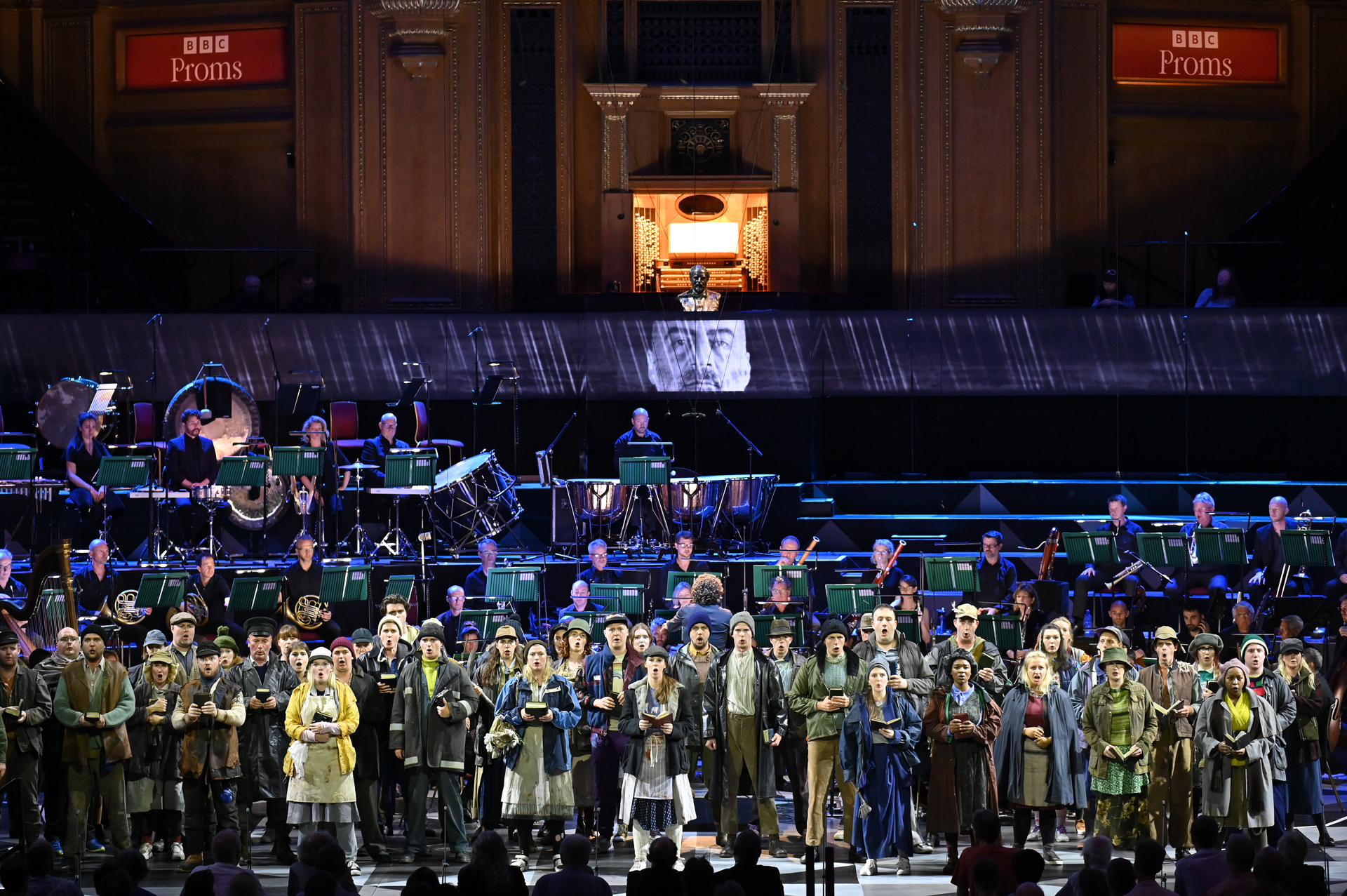Prom 13, The Wreckers, Glyndebourne review - an overloaded ship steered with pride | reviews, news & interviews
Prom 13, The Wreckers, Glyndebourne review - an overloaded ship steered with pride
Prom 13, The Wreckers, Glyndebourne review - an overloaded ship steered with pride
Ethel Smyth's grand melodrama stays seaworthy - in parts

Uncut, lovingly restored, and with two intervals in the antique manner, Ethel Smyth’s The Wreckers invites its audience to embark on an epic voyage as well as a momentous one. This summer’s Glyndebourne Festival visit to the Proms brought us the rediscovered opera about a pious, paranoid community of Cornish ship-scavengers that the trail-blazing Smyth – who judged it her signature work – laboured over for several years before its premiere in Leipzig in 1906.
Glyndebourne gave us the original French-language version with a somewhat florid libretto by Smyth’s collaborator (and sometime lover) Henry Brewster. Melly Still’s production received plenty of well-merited attention as a landmark event when it opened in Sussex in May. At the Royal Albert Hall, Donna Stirrup’s semi-staged version had to distill the marine atmospherics of the original set into a narrow curved strip of oceanic back-projections, along with intermittent sound-effects of wave and tempest. Ominous lighting both set and shifted the mood effectively, and the motley modern costumes of the coastal villagers branded the stage with a salty sense of place. What required no dilution was the whole-hearted, fine-grained playing of the London Philharmonic Orchestra under Robin Ticciati, and the fiercely controlled roar, swell and surge of the magnificent Glyndebourne chorus – a skin-prickling thrill from first to last. In spite of much fervent media advocacy for the piece, many seats at the RAH remained unoccupied – although the crowd that came certainly appreciated the spectacle. I can only agree with the prevailing critical verdict on the Glyndebourne show. Although this meticulous labour of love proves well worth the passion and the effort that drives every note and movement, The Wreckers still feels not entirely seaworthy as a vessel for regular service. From the opening overture onwards – when the Flying Dutchman almost seems to bob on the horizon – through to the crashing Liebestod that accompanies the adulterous lovers Thurza and Marc (Karis Tucker and Rodrigo Porras Garulo pictured below) as they face drowning in a tide-washed cave, the score offers sufficient highlights across an eclectic spread of turn-of-the-century styles to keep listeners alert.  The much-praised Prelude of sea-music before the second act didn’t disappoint, though it surely steers closer to Delius than Debussy. Meanwhile, from high woods to low brass and swelling strings, Ticciati’s LPO rode Smyth’s waves of sound with unwavering commitment and panache. However, a sort of laborious grandiosity in the writing too often fills the troughs between the dramatic peaks. Meandering recitatives outstay their welcome, while the principal characters don’t develop so much as repeat themselves in ever-louder and more strident ways. These deficits make Glyndebourne’s achievement in keeping the pulse firm and the tension high all the more commendable. Still, I can imagine a tightly edited Wreckers – pruned, slimmed and dramatically pointed – that really would go down a storm.
The much-praised Prelude of sea-music before the second act didn’t disappoint, though it surely steers closer to Delius than Debussy. Meanwhile, from high woods to low brass and swelling strings, Ticciati’s LPO rode Smyth’s waves of sound with unwavering commitment and panache. However, a sort of laborious grandiosity in the writing too often fills the troughs between the dramatic peaks. Meandering recitatives outstay their welcome, while the principal characters don’t develop so much as repeat themselves in ever-louder and more strident ways. These deficits make Glyndebourne’s achievement in keeping the pulse firm and the tension high all the more commendable. Still, I can imagine a tightly edited Wreckers – pruned, slimmed and dramatically pointed – that really would go down a storm.
Smyth and Brewster fling a big ask at their audience. From the off, we must accept that this sanctimonious bunch of murderers – who fix the local lighthouse in order to lure ships to their doom – believe that heaven has sanctioned their crimes and that “Everything the sea brings comes from God”. As the preacher and law-giver Pasko, bass-baritone Philip Horst does his damnedest to make the villagers’ topsy-turvy morality credible. A hollow idol undermined by his wife's desertion of his cruel creed, he gives a dark-toned performance of severe yet anguished authority. Horst makes the ingrown madness of this isolated spot almost sound sane. The rich, mellow mezzo of his young wife Thurza – Karis Tucker – comes into its own in the final scenes when she must defend her forbidden love for Marc against the baying mob. Tenor Rodrigo Porras Garulo’s Marc, who secretly tries to save passing ships with the beacons he lights, boasts the mellifluous lyricism and vocal warmth that would befit some calmer coast.
However, our 18th-century Cornish updates of Tristan and Isolde (an allusion that Smyth’s orchestration lavishly pursues) slightly pale before the true wrecker on these cliffs: Laurent Fagan’s show-stealing Avis (pictured below). Daughter of the lighthouse-keeper Laurent – James Rutherford, at times almost as scarily booming as Pasko himself – Avis loves Marc; his confession that he loves another prompts one of the opera’s finest stretches of genuine musical dialogue. Weirdly, Smyth gives Avis some charming and tuneful Carmen-ish stretches: hardly very Cornish, but attractive all the same. Clad like some Little Britain-style trailer tramp, complete with pink leggings, Fagan relishes all the mischief and malice of her role, with some bravura high-note excursions, and even a high-camp rat-killing sequence that almost veers into full-blown Mad Scene territory. At times she threatened to eclipse the swirling solemnity of the music, and acting, around her. As Marc and Thurza go on torchlit trial in the tidal cavern where they will die in terminal ecstasy, the chorus has the strongest and decisive voice. Here you might sense the true fuel behind Smyth’s conception. This rule-busting, bisexual, Suffragist rebel – in music and politics – dramatises the sinister power of a vengeful, punitive social consensus. Glyndebourne’s angry regiment, (pictured below) directed by chorus-master Aidan Oliver, flowed over and around the stage in a threatening mass of accusatory aggression. At the RAH, they sometimes seemed almost too many for the space available: a ghastly mobile blob-mob of self-righteousness. Vocally, the chorus were constantly splendid, with the knife-sharp precision of their phrasing and explosive climaxes that suddenly detonated like perfectly-aimed torpedoes. However, my companion pertinently asked why Smyth felt she had the right to define a Cornish village solely as a coven of bullying, homicidal bigots and fanatics. Should I feel some ancestral slur? OK, opera is opera: we hardly expect real Gypsies in Il Trovatore or real Gaulish Druids (whatever they were) in Norma. Yet the oddly generic and abstract nature of this clifftop dystopia fits the portentous, spacious and miscellaneous manner of Smyth’s music. Apart from a nod to Methodist hymns, we get little sense of a specifically Cornish sound-world, although she wrote at a time when composers everywhere were choosing to enrich art music (including opera) with well-researched folk elements. In the West Country itself, the collector-writer Sabine Baring-Gould had recently published Songs and Ballads of the West.
As Marc and Thurza go on torchlit trial in the tidal cavern where they will die in terminal ecstasy, the chorus has the strongest and decisive voice. Here you might sense the true fuel behind Smyth’s conception. This rule-busting, bisexual, Suffragist rebel – in music and politics – dramatises the sinister power of a vengeful, punitive social consensus. Glyndebourne’s angry regiment, (pictured below) directed by chorus-master Aidan Oliver, flowed over and around the stage in a threatening mass of accusatory aggression. At the RAH, they sometimes seemed almost too many for the space available: a ghastly mobile blob-mob of self-righteousness. Vocally, the chorus were constantly splendid, with the knife-sharp precision of their phrasing and explosive climaxes that suddenly detonated like perfectly-aimed torpedoes. However, my companion pertinently asked why Smyth felt she had the right to define a Cornish village solely as a coven of bullying, homicidal bigots and fanatics. Should I feel some ancestral slur? OK, opera is opera: we hardly expect real Gypsies in Il Trovatore or real Gaulish Druids (whatever they were) in Norma. Yet the oddly generic and abstract nature of this clifftop dystopia fits the portentous, spacious and miscellaneous manner of Smyth’s music. Apart from a nod to Methodist hymns, we get little sense of a specifically Cornish sound-world, although she wrote at a time when composers everywhere were choosing to enrich art music (including opera) with well-researched folk elements. In the West Country itself, the collector-writer Sabine Baring-Gould had recently published Songs and Ballads of the West.  In contrast, The Wreckers – which Mahler apparently considered for the Vienna Court Opera – makes a big, bold European statement. Glyndebourne has done that ambition ample justice. All the same, it can sometimes feel unanchored, unmoored and un-engaging. Wary would-be listeners may fear that this English curiosity may prove a parochial experience. Its problem could be that it’s not parochial enough.
In contrast, The Wreckers – which Mahler apparently considered for the Vienna Court Opera – makes a big, bold European statement. Glyndebourne has done that ambition ample justice. All the same, it can sometimes feel unanchored, unmoored and un-engaging. Wary would-be listeners may fear that this English curiosity may prove a parochial experience. Its problem could be that it’s not parochial enough.
The future of Arts Journalism
You can stop theartsdesk.com closing!
We urgently need financing to survive. Our fundraising drive has thus far raised £49,000 but we need to reach £100,000 or we will be forced to close. Please contribute here: https://gofund.me/c3f6033d
And if you can forward this information to anyone who might assist, we’d be grateful.

Subscribe to theartsdesk.com
Thank you for continuing to read our work on theartsdesk.com. For unlimited access to every article in its entirety, including our archive of more than 15,000 pieces, we're asking for £5 per month or £40 per year. We feel it's a very good deal, and hope you do too.
To take a subscription now simply click here.
And if you're looking for that extra gift for a friend or family member, why not treat them to a theartsdesk.com gift subscription?
more Opera
 Carmen, English National Opera review - not quite dangerous
Hopes for Niamh O’Sullivan only partly fulfilled, though much good singing throughout
Carmen, English National Opera review - not quite dangerous
Hopes for Niamh O’Sullivan only partly fulfilled, though much good singing throughout
 Giustino, Linbury Theatre review - a stylish account of a slight opera
Gods, mortals and monsters do battle in Handel's charming drama
Giustino, Linbury Theatre review - a stylish account of a slight opera
Gods, mortals and monsters do battle in Handel's charming drama
 Susanna, Opera North review - hybrid staging of a Handel oratorio
Dance and signing complement outstanding singing in a story of virtue rewarded
Susanna, Opera North review - hybrid staging of a Handel oratorio
Dance and signing complement outstanding singing in a story of virtue rewarded
 Ariodante, Opéra Garnier, Paris review - a blast of Baroque beauty
A near-perfect night at the opera
Ariodante, Opéra Garnier, Paris review - a blast of Baroque beauty
A near-perfect night at the opera
 Cinderella/La Cenerentola, English National Opera review - the truth behind the tinsel
Appealing performances cut through hyperactive stagecraft
Cinderella/La Cenerentola, English National Opera review - the truth behind the tinsel
Appealing performances cut through hyperactive stagecraft
 Tosca, Royal Opera review - Ailyn Pérez steps in as the most vivid of divas
Jakub Hrůša’s multicoloured Puccini last night found a soprano to match
Tosca, Royal Opera review - Ailyn Pérez steps in as the most vivid of divas
Jakub Hrůša’s multicoloured Puccini last night found a soprano to match
 Tosca, Welsh National Opera review - a great company reduced to brilliance
The old warhorse made special by the basics
Tosca, Welsh National Opera review - a great company reduced to brilliance
The old warhorse made special by the basics
 BBC Proms: The Marriage of Figaro, Glyndebourne Festival review - merriment and menace
Strong Proms transfer for a robust and affecting show
BBC Proms: The Marriage of Figaro, Glyndebourne Festival review - merriment and menace
Strong Proms transfer for a robust and affecting show
 BBC Proms: Suor Angelica, LSO, Pappano review - earthly passion, heavenly grief
A Sister to remember blesses Puccini's convent tragedy
BBC Proms: Suor Angelica, LSO, Pappano review - earthly passion, heavenly grief
A Sister to remember blesses Puccini's convent tragedy
 Orpheus and Eurydice, Opera Queensland/SCO, Edinburgh International Festival 2025 review - dazzling, but distracting
Eye-popping acrobatics don’t always assist in Gluck’s quest for operatic truth
Orpheus and Eurydice, Opera Queensland/SCO, Edinburgh International Festival 2025 review - dazzling, but distracting
Eye-popping acrobatics don’t always assist in Gluck’s quest for operatic truth
 MARS, Irish National Opera review - silly space oddity with fun stretches
Cast, orchestra and production give Jennifer Walshe’s bold collage their all
MARS, Irish National Opera review - silly space oddity with fun stretches
Cast, orchestra and production give Jennifer Walshe’s bold collage their all
 Káťa Kabanová, Glyndebourne review - emotional concentration in a salle modulable
Janáček superbly done through or in spite of the symbolism
Káťa Kabanová, Glyndebourne review - emotional concentration in a salle modulable
Janáček superbly done through or in spite of the symbolism

Add comment